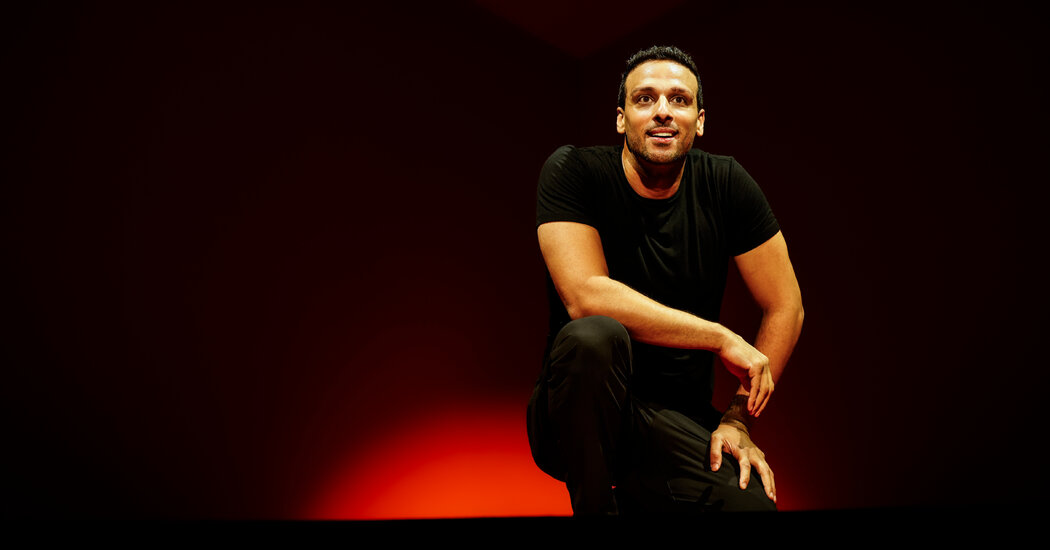Autobiography is never merely a single individual’s story. That’s part of what makes it risky — because one person’s life intersects with others’, and what’s left if you omit those? Necessary truth-telling is dicey, too, because an honest accounting of the past isn’t necessarily a flattering one.
Ari’el Stachel’s autobiographical solo play, “Other,” opens on Tony Awards night in 2018, when he has just won for his supporting performance in the musical “The Band’s Visit.” Right away he’s funny, precisely etching role after role: a publicist, a producer, a fan. And right away he’s sympathetic, because not only is Stachel the character sweating profusely, as the scene depicts; Stachel the actor is as well, the perspiration dripping from his chin.
“Other,” directed by Tony Taccone at Greenwich House Theater in Manhattan, has several themes, one being Stachel’s severe anxiety and how it has shaped his life and career. He is only 5, growing up in California, when he receives a diagnosis of obsessive-compulsive disorder, and not much older when, at the encouragement of a therapist, he names the voice in his head — the one that makes the illness’s irrational demands — Meredith, after the malevolent, would-be stepmother in the 1998 reboot of “The Parent Trap.”
Another theme is the racism and xenophobia he encountered, starting in childhood, and how that accelerated after the Sept. 11 terrorist attacks. The son of an Ashkenazi Jewish American mother and a Yemenite Israeli father, he is 10 then, and suddenly desperate not to look Middle Eastern, like his father. He begins trying to camouflage his identity, first as white, then as Black. He takes care not to let people in other parts of his life encounter his father, which would give his heritage away.
It is a compliment to Stachel that this is the most wrenching element of “Other” because, of the dozens of characters in the show, his father is hands-down the sweetest, steadiest and most benevolent. Stachel’s portrayal of him is a love letter, and maybe an apology, too, for a denial of his father, and of his own identity, that went on well into college. It’s not a likable thing to admit. But he wouldn’t be telling this story if he hadn’t had a reckoning with his shame.
The show, which was previously titled “Out of Character,” could benefit from revision where he mentions having posted on social media about the Oct. 7 Hamas-led attack on Israel. That section seems a little self-obsessed, as if the world had been clamoring for his input.
His larger point, though, is the philosophy behind the show.
“We don’t need to exist in binaries,” he says. “Can’t we all just be humans — together?”
Across town at the Public Theater, Zoë Kim’s slender, poetic solo play “Did You Eat? (밥 먹었니?)” presents a grim flip side of the parent-child love dynamic inside a show that also has to do with race, belonging and American identity.
Kim has a mental image of her mother as a newlywed in South Korea in the 1980s, pregnant with her but wishfully certain that she is carrying a boy. She needs a son, really, to prove her wifely worth and to justify her sacrifice, for motherhood, of the scientific career she’d dreamed of having.
For Kim’s parents, it was “a tragic day” when she was born instead, she says in the play, the first installment of her planned trilogy about hunger in its various guises — in this case, an emotional near-starvation that lasts her first 20 years. Directed by Chris Yejin for Ma-Yi Theater Company, it is an account of parental abuse, and it comes with a content advisory that specifies “childhood trauma, self-harm and suicidal ideation.”
Running scarcely over an hour, it is structured in three acts, and the first two are sometimes harrowing, particularly when Kim is at the American boarding school her parents send her to as a teenager, after her doting grandmother dies. But the third act is the pivot, where the play becomes a persuasive story of psychic healing and the power of steady, determined love.
When, during Kim’s high school years, her father’s abuse and her mother’s enabling of it become most horrific — threatening her life, then her education — the story could benefit from added practical detail about how she survived and managed to stay in the United States. Too much vagueness is distracting. So is the unexplained glowing white orb that she talks to intermittently throughout the performance. My guess is that it represents her inner child, to which the show is meant to be addressed.
“Did You Eat?” doesn’t go in for sentimentality, so it is only at the very end that the audience sees a baby photo of Kim, projected onstage. Lying on her stomach in a sun-dappled field, she is small, watchful, unsmiling. And, we know by then, very much in need of protection.
“Did You Eat? (밥 먹었니?)”
Through Nov. 16 at the Public Theater, Manhattan; publictheater.org. Running time: 1 hour 5 minutes.
Other
Through Dec. 6 at Greenwich House Theater, Manhattan; othertheplay.com. Running time: 1 hour 25 minutes.
The post In Two Solo Plays, a Search for Belonging and Parental Love appeared first on New York Times.




